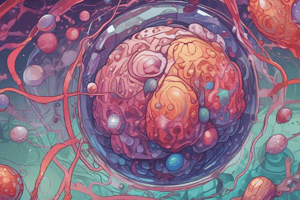Podcast
Questions and Answers
What are some of the major chemical structures of autacoids?
What are some of the major chemical structures of autacoids?
- Enzymes and vitamins
- Peptides/proteins, steroids, amines, and acetylcholine (correct)
- Carbohydrates and nucleic acids
- Gases and minerals
In what role were autacoids initially considered in relation to inflammation?
In what role were autacoids initially considered in relation to inflammation?
- Mediators of cell growth
- Mediators of inflammation (correct)
- Antioxidants
- Cell membrane receptors
What is one promising aspect of autacoids in the treatment of chronic inflammatory conditions?
What is one promising aspect of autacoids in the treatment of chronic inflammatory conditions?
- They can modify functions of cells and tissues during inflammation (correct)
- They have no impact on chronic pain
- They play no role in inflammation
- They can cause inflammation to worsen
Which organs are associated with chronic inflammation due to autacoids?
Which organs are associated with chronic inflammation due to autacoids?
What led to a decline in the use of the term 'autacoid' over time?
What led to a decline in the use of the term 'autacoid' over time?
Despite the decline in the use of the term 'autacoid,' what remains significant?
Despite the decline in the use of the term 'autacoid,' what remains significant?
Where are autacoids produced?
Where are autacoids produced?
How are autacoids terminated?
How are autacoids terminated?
How do autacoids disseminate?
How do autacoids disseminate?
What type of receptors do autacoids bind to?
What type of receptors do autacoids bind to?
Study Notes
Autacoids: The Endogenous Substances with Complex Physiological and Pathophysiological Functions
Autacoids are locally produced modulating factors that influence the function of cells and/or tissues in a non-autonomic manner. These endogenous substances have complex physiological and pathophysiological functions, including modulating the inflammatory and immune response. Autacoids are not stored in glands or tissues but are produced on demand. They are involved in chronic inflammations of the kidney, liver, heart, and brain, creating pharmaceutical development challenges.
Characteristics of Autacoids
Autacoids have several characteristics that distinguish them from other endogenous substances:
- Produced in: Autacoids are produced in cells, not in glands or tissues like hormones.
- Stored in: They are not stored in glands or tissues but are produced on demand.
- Binding to: Autacoids bind to membrane or nuclear receptors, unlike hormones, which bind to membrane receptors.
- Dissemination via: They are disseminated via the intercellular space rather than the blood like hormones.
- Terminating of action via: Autacoids are terminated via intracellular metabolization, unlike hormones, which are terminated via degradation in the blood or endocytosis of the receptor-hormone complex.
Major Chemical Structures of Autacoids
Autacoids have a variety of chemical structures, including peptides/proteins, steroids, amines, biogenic amines, amino acids, and acetylcholine. Lipids are another major class of autacoids.
Autacoids and Inflammation
Autacoids have been found to play an important role in chronic pain states. They were initially considered only mediators of inflammation, but subsequent research has shown that they can also modify the functions of cells and tissues during inflammation. This makes them promising targets for the treatment of chronic inflammatory conditions.
Autacoids and Chronic Inflammation
Autacoids have been associated with chronic inflammation of the kidney, liver, heart, and brain. These autacoids play a significant role in chronic pain states and have been found to influence the immune process at different stages. Their identification and characterization have led to a number of patents and stimulated research in the field of chronic inflammation treatment.
The Decline of the Term "Autacoid"
Despite their significance and potential, the use of the term "autacoid" has declined since 1992. In that year, more than 8,000 publications could be identified in PubMed, dropping to around 4,000 in 2015. However, the potential value of autacoid medicine was recognized as early as 1964, when it was suggested that physiological compounds could forestall the first irreversible changes in cells.
Conclusion
Autacoids are a diverse group of endogenous substances that play crucial roles in physiological and pathophysiological processes. Their complex functions and varied chemical structures make them valuable targets for the development of new therapeutic strategies. Despite the decline in the use of the term "autacoid," the potential of these substances in the treatment of chronic inflammatory conditions remains significant.
Studying That Suits You
Use AI to generate personalized quizzes and flashcards to suit your learning preferences.
Description
Explore the complex physiological and pathophysiological functions of autacoids, locally produced substances that influence cells and tissues. Learn about their characteristics, major chemical structures, role in inflammation, and significance in chronic inflammatory conditions.




